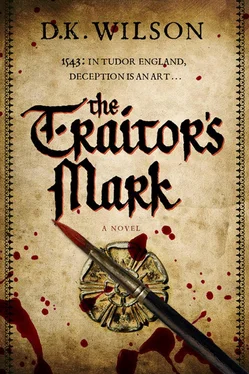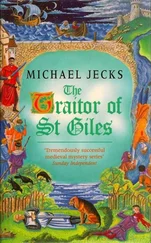D. Wilson - The Traitor’s Mark
Здесь есть возможность читать онлайн «D. Wilson - The Traitor’s Mark» весь текст электронной книги совершенно бесплатно (целиком полную версию без сокращений). В некоторых случаях можно слушать аудио, скачать через торрент в формате fb2 и присутствует краткое содержание. Год выпуска: 0101, Издательство: Pegasus Books, Жанр: Исторический детектив, на английском языке. Описание произведения, (предисловие) а так же отзывы посетителей доступны на портале библиотеки ЛибКат.
- Название:The Traitor’s Mark
- Автор:
- Издательство:Pegasus Books
- Жанр:
- Год:0101
- ISBN:нет данных
- Рейтинг книги:5 / 5. Голосов: 1
-
Избранное:Добавить в избранное
- Отзывы:
-
Ваша оценка:
- 100
- 1
- 2
- 3
- 4
- 5
The Traitor’s Mark: краткое содержание, описание и аннотация
Предлагаем к чтению аннотацию, описание, краткое содержание или предисловие (зависит от того, что написал сам автор книги «The Traitor’s Mark»). Если вы не нашли необходимую информацию о книге — напишите в комментариях, мы постараемся отыскать её.
The Traitor’s Mark — читать онлайн бесплатно полную книгу (весь текст) целиком
Ниже представлен текст книги, разбитый по страницам. Система сохранения места последней прочитанной страницы, позволяет с удобством читать онлайн бесплатно книгу «The Traitor’s Mark», без необходимости каждый раз заново искать на чём Вы остановились. Поставьте закладку, и сможете в любой момент перейти на страницу, на которой закончили чтение.
Интервал:
Закладка:
‘Perhaps you won’t object if I remind you that Jesus enjoins us to love our enemies.’
I must have looked crestfallen, for his smile broadened and he added, ‘Fortunately, our Lord said nothing about loving other people’s enemies.’ After a pause, he continued, ‘I have looked at the painting. Its message is clear: treason. These people wish to overthrow Church and state, as established by his gracious majesty. That we cannot permit. Yet, it dismays me to see a man of Sir Thomas’s talent and long years of service to the Crown becoming the agent of a foreign power.’
Morice said, ‘He’s obviously been concealing his real allegiance for many years.’
Cranmer nodded. ‘So it would seem. We have always known that he has a hankering after the old ways but his behaviour up till now has been correct. I was appalled to hear of his treatment of poor Richard.’
‘Your Grace, a royal messenger arrived this afternoon with a letter from Anthony Denny. He is drawing up Turner’s pardon for the king’s signature.’
‘Good, good. Perhaps we should arrange for Richard to rest for a while. It makes little sense to aggravate discord.’
Morice tugged at his beard and gave a discreet cough. ‘With respect, Your Grace, may I suggest that it might be interpreted as a sign of weakness. Thanks to Master Holbein’s endeavours, we can now take the offensive against all this subtle and secretive plotting. With the evidence we have, we can arrest Moyle. Denny also reports that Thomas Legh will be with us by tomorrow evening at the latest. With him leading your commission, all the enemies of Church and state will rapidly be brought to heel. The Duke of Norfolk has laid his last plot. When his majesty sees Master Holbein’s notes nothing can save him.’
Cranmer frowned. ‘Ralph, be careful. If you play the political game you may yet find yourself outmanoeuvred. If the king wished to be rid of his lordship, he has had many opportunities in the past to do so. Norfolk is a survivor, and if we fail to dislodge him …’
‘Then, Your Grace, at least the king may have his eyes opened to the subversive activities of the imperial ambassador. That could mean an end to this talk of a joint war with the Emperor against France.’
‘That would certainly be a great prize,’ Cranmer agreed.
‘Then shall I proceed with the warrant for Sir Thomas’s arrest?’
‘The archbishop sighed deeply. ‘Yes,’ he said.
The following morning, Ned and Dick made ready to depart for Hemmings. We stood in the great courtyard watching Morice assemble a large troop of mounted guards to ride to Ashford. He strolled across to us.
‘His grace has decided that I should go with them,’ he said. ‘Would you like to keep me company?’
‘I must admit it would give me some pleasure to witness Sir Thomas’s humiliation.’
He grinned. ‘That’s a reward you have richly deserved. We’ll leave as soon as you are ready. And here is the colour copy of the shield.’ He handed me a folded paper.
As we journeyed towards Moyle’s mansion at Eastwell we were both in ebullient mood and talked of many things. I asked how long Morice had been in the archbishop’s service.
‘Since before he was archbishop,’ Morice said. ‘I joined him fifteen years ago, soon after leaving university. We were both at Cambridge, though he was a fellow at Jesus when I was a mere undergraduate. Brave days! Brave days!’
‘Why do you say that?’
‘That was when it all began – the discovery of Bible truth; the changes in the church. You can’t imagine how exciting it was. Latimer was drawing crowds to hear him at St Edmund’s. Robert Barnes was preaching at the Augustine priory. Salesmen came to the town with books smuggled in from Germany. We students read them in secret, gobbling up the pure Gospel, meeting at the White Horse to discuss forbidden truths, defying the authorities, risking discovery and having our books burned – if not ourselves. Brave days!’
‘You think things are less good now?’
‘I think when you stir politics into the pot it turns the mixture sour. We’re rid of the pope. That is good. The Bible is in English. That is good. But we walk not on a straight path illumined by the Gospel. We are not the godly commonwealth that Lord Cromwell and others gave their lives for.’
‘And for which Archbishop Cranmer strives.’
‘Of course.’
‘Will it ever come, this godly commonwealth?’
‘We must believe so and work towards it. Otherwise the sacrifices of people like Johannes Holbein will have been in vain.’
‘He did not give his life for a perfect England,’ I said. ‘He thought the reformed nations had gone too far; that they had their own kinds of violence and oppression and were no better than those where the pope still reigns.’
‘I find that difficult to aecept. He must have believed in something. No man would risk what he risked without being sustained by faith of some kind.’
I pondered my answer. ‘I think he believed in good people. He revered Cromwell. He had a genuine affection for the archbishop.’
‘And you, Thomas? What do you believe in this world of confused and conflicting ideas?’
‘I don’t care much for ideas … doctrines … official statements of faith. They all make men do strange things – sometimes heroic things but also violent, abominable things. Once, like Holbein, I was impressed by Lord Cromwell – until he did something terrible in pursuit of an ideal. So, perhaps I’m still looking for someone to believe in, someone so obviously good that I want to share whatever it is that he has found. That’s not a scholar’s answer to your question but it’s the best answer I can give at the moment.’
Morice turned to me with a warm smile. ‘I think it’s an excellent answer and a better one than I’ve heard many supposedly clever scholars give. Hold to it, Thomas, and one day you will find that person you’re looking for. He or she won’t be perfect. Never make the mistake of seeking perfection. But that person will be genuine, and honest and good-hearted and worthy of your trust.’
With such discussion, as well as talk of trivial things, we passed the journey to Eastwell. Arrived at the impressive centre of Moyle’s domain we dismounted, and, leaving the guard in the courtyard, we approached the main entrance. The door opened before we reached it to reveal, not one of the owner’s many servants, but the owner himself. He greeted Morice with a smile and looked me over with a less friendly expression. ‘I bid you welcome,’ he said, ‘but why do, you come with such a large escort?’
‘I bear an urgent message from his grace, the Archbishop of Canterbury and Primate of All England.’ Morice spoke in a tone that made the formal announcement sound all the more frigid.
Moyle nodded in acknowledgement and preceded us into the hall. ‘We’ll go to my parlour.’
The spacious chamber was richly furnished and lined with Flemish tapestries. Moyle waved us to chairs close to the hearth where large logs smouldered. Morice unfastened his purse to take out the warrant. But my attention was focused elsewhere. I stood transfixed, staring at the space above the fireplace. There, in full, exuberant blazon, was the Moyle coat of arms. The shield at the centre of the design,' enfolded in extravagant red and white mantling, was comprised of a black chevron and three black moles, all on a white ground.
Chapter 20
‘Is this your family coat of arms?’ A stupid question spoken out of shock and confusion.
‘Of course it is.’ Moyle turned to look at the armorial decoration. ‘Argent, a chevron sable, between three moles of the second,’ he declared with obvious pride. ‘What is your interest in it?’
Читать дальшеИнтервал:
Закладка:
Похожие книги на «The Traitor’s Mark»
Представляем Вашему вниманию похожие книги на «The Traitor’s Mark» списком для выбора. Мы отобрали схожую по названию и смыслу литературу в надежде предоставить читателям больше вариантов отыскать новые, интересные, ещё непрочитанные произведения.
Обсуждение, отзывы о книге «The Traitor’s Mark» и просто собственные мнения читателей. Оставьте ваши комментарии, напишите, что Вы думаете о произведении, его смысле или главных героях. Укажите что конкретно понравилось, а что нет, и почему Вы так считаете.












